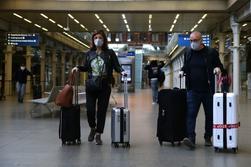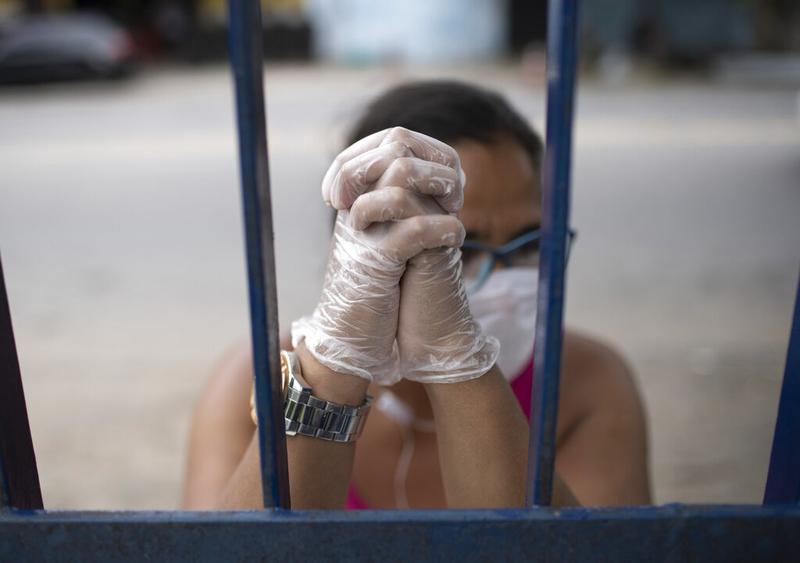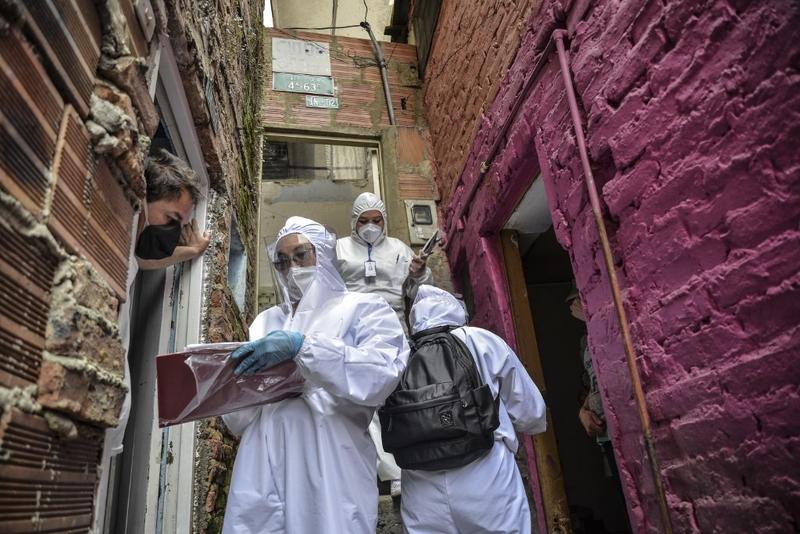 Passngers arrive at the Eurostar terminal at St Pancras station in London on May 6, 2020 as life continues under a nationwide lockdown imposed to slow the spread of the novel coronavirus. (ISABEL INFANTES / AFP)
Passngers arrive at the Eurostar terminal at St Pancras station in London on May 6, 2020 as life continues under a nationwide lockdown imposed to slow the spread of the novel coronavirus. (ISABEL INFANTES / AFP)
ZURICH / GENEVA / LONDON / WASHINGTON / STOCKHOLM / ATHENS - France will lay out its plan to roll back lockdown measures, joining countries including Germany, Italy and the Netherlands in easing restrictions as the economic pain from the fallout of the coronavirus intensifies.
French Prime Minister Edouard Philippe is to unveil final details of his plan to end curbs on public life later on Thursday. The country is preparing to go back to work and reopen schools starting on Monday in a gradual process designed to avoid a second wave of infections.
France's death toll from the novel coronavirus rose to 25,809, the world's fifth-highest behind the United States, Britain, Italy and Spain, according to figures released on Wednesday by the French Health Ministry.
On a daily basis, the tally grew by 278, slower than Tuesday's 330 and Monday's 306.
From May 11, France will start to slowly ease confinement to guarantee people safety and inject dynamism into a plunging economy though economic activity still remains a third below normal levels, the INSEE official statistics agency said on Thursday.
Despite more than 140,000 deaths on the continent, European leaders are feeling the heat to accelerate a return to normality and are trying to walk a fine line between reactivating the economy and avoiding a renewed outbreak.
WHO
The World Health Organization (WHO) warned on Wednesday that countries emerging from restrictions to halt the new coronavirus must proceed “extremely carefully” or risk a rapid rise in new cases.
Director-General Tedros Adhanom Ghebreyesus said countries needed to ensure they had adequate measures to control the spread of the COVID-19 respiratory disease like tracking systems and quarantine provision.
“The risk of returning to lockdown remains very real if countries do not manage the transition extremely carefully and in a phased approach,” he said at a virtual briefing in Geneva.
Meanwhile, the WHO has issued specific recommendations for the using of masks and PPEs in hospitals and other frontline medical scenarios, aiming at both protecting workers and preserving gear for where it is needed most.
ALSO READ: WHO: Willing to offer advice but not make decisions on sports
Global toll
Global COVID-19 deaths surpassed 260,000 on Wednesday afternoon, reaching 260,487 as of 2:32 pm , according to the Center for Systems Science and Engineering (CSSE) at Johns Hopkins University.
A total of 3,721,779 cases have been reported from over 180 countries and regions in the world, according to the CSSE.
Germany
The coronavirus pandemic will last for at least the rest of this year, German Chancellor Angela Merkel’s chief of staff told Deutschlandfunk radio on Thursday.
“We are not living after the pandemic now - rather we are living in the middle of a pandemic, one that will be with us for a while - at least for this year and that’s being very optimistic,” Helge Braun said.
Merkel announced steps on Wednesday to ease the coronavirus lockdown in Germany but at the same time launched an “emergency brake” mechanism allowing for renewed restrictions in case infections pick up again.
Just as Germany paves the way for a broad economic restart, the number of new coronavirus cases rose by the most in six days, and fatalities increased the most since April 18. There were 1,155 additional infections in the 24 hours through Thursday morning, lifting the total to 168,162, according to data from Johns Hopkins University. Fatalities rose by 282, the most since April 18, to 7,275.
On the positive side, a measure of the contagion rate, known as the reproduction factor, declined to 0.65 from 0.71 the previous day.
Italy
Italy’s infections rose the most in four days on Thursday, as Prime Minister Giuseppe Conte battles tensions within his coalition over a new stimulus package for the country’s paralyzed economy. The government may allow shops to reopen before a planned date of May 18, and bars and restaurants may open on June 1 under current government plans.
A further 369 COVID-19 patients had died in the past 24 hours in Italy, bringing the country's death toll to 29,684, out of total infection cases of 214,457, according to fresh figures on Wednesday.
The country's Civil Protection Department registered 91,528 active infections on Wednesday, down sharply from 98,467 a day earlier. Wednesday also saw 8,014 additional recoveries, bringing that total to 93,245, higher than the active infections for the first time since the pandemic struck the northern Lombardy region in late February.
UK
Prime Minister Boris Johnson will announce a very limited easing of Britain’s coronavirus lockdown next week, adopting a cautious approach to ensure there is no second peak of infections that could further hurt the economy.
Johnson is due to announce the next steps in Britain’s battle to tackle the novel coronavirus on Sunday following a review by ministers of the current measures that have all but shut the economy and kept millions at home.
At a cabinet meeting of his top ministers, Johnson said Britain would advance “with maximum caution” and be guided by the science and data when considering whether any of the strict social distancing measures could be eased.
 A volunteer seals a clean face mask in a plastic bag as part of a project to help slow the spread of the new coronavirus, in Baldwin Hall dormitory at Mercyhurst University in Erie, Pa.,May 6, 2020. (PHOTO / AP)
A volunteer seals a clean face mask in a plastic bag as part of a project to help slow the spread of the new coronavirus, in Baldwin Hall dormitory at Mercyhurst University in Erie, Pa.,May 6, 2020. (PHOTO / AP)
US
US Agriculture Secretary Sonny Perdue, during a meeting with President Donald Trump and Iowa Governor Kim Reynolds, said he expects meatpacking plants to fully resume operations within a week to 10 days. Slaughterhouses and processing facilities have been hit hard by outbreaks of the virus, leading some to shut down and sparking supply shortages.
Trump said the US has “plenty of supply” of meat. “Within a week and a half, we’ll be in great shape. Maybe sooner,” the president told reporters in the Oval Office.
Meanwhile, Los Angeles Mayor Eric Garcetti Wednesday laid out the city's roadmap for reopening businesses in the wake of the coronavirus pandemic, adding some certain types of stores are allowed to reopen with safety precautions.
Coronavirus cases in the US rose 1.9 percent as compared to the same time yesterday, to 1.22 million, according to data collected by Johns Hopkins University and Bloomberg News. It was a second day with an increase of 1.9 percent, below the average daily increase of 2.5% over the past week. Deaths rose 2.8 percent to 72,233.
Greece
After standing empty for two months, Greece’s ancient sites, including the Acropolis hill towering over Athens, will reopen to visitors on May 18, authorities said on Thursday.
The ancient monuments were closed along with museums in mid-March in Greece’s lockdown to curb the spread of the coronavirus. Restrictions have gradually been eased this week.
Museums will open again in mid-June while open-air performances will resume in mid-July, Culture Minister Lina Mendoni said. Distance and safety rules will apply.
The many historical sites are one of the mainstays of Greece’s vital tourism sector and efforts will now kick in to encourage visitors after travel restrictions and widespread closures caused a collapse in bookings.
Spain
Spain was weighing up further steps on Thursday to bring life back to normal as the coronavirus epidemic ebbed, but the capital Madrid and the city of Barcelona could remain under tight restrictions for the time being.
Both cities and their surroundings have registered the highest number of coronavirus deaths and infections in Spain, one of the countries worst hit by the global pandemic.
But with the economy reeling and citizens chafing for an end to a lockdown that has kept them largely confined to their homes for eight weeks, Prime Minister Pedro Sanchez’s government is anxious to get the country up and running again without igniting a second wave of infections.
The Health Ministry gave Spain’s coronavirus death toll for the past 24 hours as 213 on Thursday, down from 244 the previous day and far below peaks of nearly 1,000 in early April.
That brought total deaths to 26,070. The number of diagnosed cases rose to 221,447 from 220,325 the previous day.
Sweden
Deaths in Sweden from COVID-19 passed 3,000 on Thursday, the Public Health Agency said, far more than in neighbouring Nordic countries.
The official death toll has now reached 3,040, up from 2,941 on Wednesday.
Sweden has taken a softer approach to fighting the coronavirus, leaving most schools, shops and restaurants open and relying on voluntary measures focused on social distancing and good hygiene.
Deaths in Sweden has been far higher relative to the size of the population than in Denmark, Norway and Finland, where authorities have taken a stricter approach. But they have been lower than in Britain, France and Spain, where there have also been lockdowns.
Russia
Russia’s coronavirus cases overtook France and Germany on Thursday to become the fifth highest number in the world after a record daily rise, and Moscow’s mayor said the real figure, not captured by official statistics, was much higher.
The official tally surged to 177,160, meaning Russia now has more registered cases than Germany or France, as the number of new cases of the novel coronavirus jumped by 11,231 in the past 24 hours.
More than half of all cases and deaths are in Moscow, the epicentre of Russia’s outbreak, which on Thursday reported a record overnight increase of 6,703 new cases, bringing its official total to 92,676.
But Moscow Mayor Sergei Sobyanin said research showed the real number of cases in the Russian capital was around 300,000, or more than triple the official figure.
Moscow’s health department said that late-stage testing for the coronavirus often produced false negative results and that more and more Muscovites displayed no symptoms or suffered only mild cases.
Moscow and other Russian regions are in their sixth week of a lockdown. The capital’s residents have been told to stay at home except in certain circumstances, such as going out to buy food and medicine. They must obtain a digital permit to travel anywhere by public or private transport.
Poland
Poland plans to test 1,000 miners a day at drive-through sites to check whether they have been infected with the coronavirus as data show a rapid growth in new cases in the coal region.
Poland has reported 14,898 infections, including 737 deaths. Earlier this week the Silesia mining region in southern Poland showed the highest number of infections at 3,025.
Poland’s biggest coal group, PGG, which employs around 40,000 people, has reported 384 cases of coronavirus among its workers, its spokesman said, adding that 1,516 were in quarantine. In total 481 miners are infected in Poland, which generates most of its electricity from coal.
Finland
Finland’s government will work remotely at least until the end of this week as a precaution, it said on Thursday, after two ministers were possibly exposed to the coronavirus this week.
Minister of Social Affairs and Health Aino-Kaisa Pekonen and Minister of Employment Tuula Haatainen were on Tuesday in the same room with a person suspected to have contracted the disease.
A smartphone-based application (app) designed to help healthcare professionals track COVID-19 infection chains will be ready for use in Finland in June, national broadcaster Yle reported on Wednesday.
The application will be tested two weeks from now in the hospital district of Vaasa in western Finland, said Sampo Pasanen, managing director of Reaktor Finland, in an interview with Yle. Reaktor, a Finnish company offering information technology (IT) expert services, is one of the app's developers.
Canada
The Canadian province of British Columbia will begin reopening its economy as early as mid-May, the premier said on Wednesday, as new coronavirus cases dwindle and other parts of the country, including Quebec and Manitoba, begin to loosen their restrictions.
The Pacific Coast province reported Canada’s first death from COVID-19, the respiratory illness caused by the novel coronavirus, and its first case of community transmission, but reported only 23 new cases on Wednesday.
 Andrea Silva, 44, waits for the results of her father's COVID-19 test at the Marechal Hermes Urgent Care Unit, amid the new coronavirus pandemic in Rio de Janeiro, Brazil, May 6, 2020. (PHOTO / AP)
Andrea Silva, 44, waits for the results of her father's COVID-19 test at the Marechal Hermes Urgent Care Unit, amid the new coronavirus pandemic in Rio de Janeiro, Brazil, May 6, 2020. (PHOTO / AP)
Switzerland
The Swiss government expects the cost of jobless benefits and short-time working compensation arising from the coronavirus crisis to jump to some 20 billion francs (US$20.51 billion) this year from 6-7 billion normally, an official said on Thursday.
The Swiss unemployment rate rose to 3.3% in April - compared with an average 2.3% in 2019 - with 153,000 people registered as jobless. It rose again to 3.4% at the start of May, Zuercher said, as companies struggled with collapsing demand and the hospitality industry went into shutdown mode.
The COVID-19 respiratory disease has killed 1,505 people in Switzerland, with more than 30,000 people testing positively, although the infection rate has slowed in recent days, allowing the government to begin relaxing restrictions.
Netherlands
The number of confirmed coronavirus cases in the Netherlands have risen by 455 to 41,774, with 84 new deaths, health authorities said on Thursday.
The country’s death toll stands at 5,288, the National Institute for Health (RIVM) said in its daily update. The RIVM cautioned that it only reports confirmed cases, and actual numbers are higher.
The Netherlands will accelerate its plan to reopen more of the economy by at least a week, allowing hairdressers, nail salons and beauty parlors to start work again on Monday.
Restaurants, bars and movie theaters will be allowed to reopen beginning on June 1, with restrictions to comply with the “1.5 meter society” which will remain in place for the foreseeable future, Prime Minister Mark Rutte said, referring to the social-distancing standard, equivalent to about 5 feet.
The Dutch Safety Board said on Thursday it would conduct an independent investigation and review of the country’s preparedness and government performance during the coronavirus outbreak.
The announcement came a day after Prime Minister Mark Rutte announced a three-month roadmap toward relaxing lockdown measures announced in mid-March, including opening schools and some businesses.
Brazil
Brazil’s Congress approved two stimulus bills that will provide financial help to states and municipalities, and set aside 700 billion reais (US$122 billion) for the economic recovery from the pandemic while also allowing the central bank to buy corporate bonds.
The first constitutional amendment -- dubbed the “war budget” -- allows the government to bypass fiscal responsibility laws during the coronavirus crisis. It was approved by 477-1 votes during a remote session of the lower house Wednesday.
El Salvador
El Salvador will from Thursday temporarily suspend public transport in a bid to strengthen efforts to contain the spread of the coronavirus pandemic, the government said on Wednesday.
A decree published by the government on Wednesday said the measure would remain in place for 15 days.
El Salvador, which has reported 15 deaths from the pandemic, has applied some of the toughest measures in the Americas to tackle the coronavirus. That has sparked complaints by some human rights groups that the government is overreaching itself.
READ MORE: Germany to ease lockdown as 1st phase of pandemic passes
Colombia
Colombia has declared a second state of emergency to support sectors of the economy that will remain shut down for an extended period to reduce the spread of the novel coronavirus, President Ivan Duque said on Wednesday.
Colombia has removed the contact-tracing feature in its official app for informing residents about the novel coronavirus after experiencing glitches, but aims to rebuild using potentially more reliable technology from Apple Inc and Alphabet Inc’s Google, a government official told Reuters.
The previously unreported moves by the Colombian government add to a growing number of accounts of countries adopting the Apple-Google technology and dropping alternatives aimed at helping them curtail outbreaks faster.
 Workers of Bogota's Mayor's office wear protective suits to avoid getting infected with COVID-19 as they conduct a census at Egipto neighbourhood in Bogota on April 19, 2020 (DIANA SANCHEZ / AFP)
Workers of Bogota's Mayor's office wear protective suits to avoid getting infected with COVID-19 as they conduct a census at Egipto neighbourhood in Bogota on April 19, 2020 (DIANA SANCHEZ / AFP)
Mexico
Mexico reported 1,609 new COVID-19 cases and 197 more deaths during the last 24 hours, bringing the total in the country to 27,634 cases and 2,704 deaths, the country's health ministry said on Wednesday.
Mexico reported 1,120 new cases of COVID-19 and 236 new deaths on Tuesday. There are also 16,099 suspected cases.
At least 47 residents and three workers have been infected with coronavirus at a retirement home in the northern Mexican state of Nuevo Leon, authorities said on Wednesday, in one of the biggest outbreaks yet reported in the country.
Mexican President Andres Manuel Lopez Obrador said on Tuesday that he hoped to gradually reopen productive and social activities as early as May 17, provided that the health situation in the country does not worsen.
Egypt
The Egyptian Health Ministry reported on Wednesday 387 new cases and 17 deaths of COVID-19, raising the total infections registered in the country to 7,588 and the death toll to 469.
Meanwhile, 85 COVID-19 patients were completely cured and discharged from hospitals on Wednesday, increasing total recoveries to 1,815, said the ministry's spokesman Khaled Megahed in a statement.
El Youbi said 183 deaths from COVID-19 were reported so far, after the announcement of two cases of death in the past 24 hours.
ALSO READ: Ecuador indigenous community fears extinction from COVID-19
Morocco
Moroccan ministry of health on Wednesday reported 189 new infections with COVID-19, bringing the total number to 5,408.
The number of recovered cases increased to 2,017 with 179 new recoveries, while some 73 patients are being treated in intensive care units, announced Director of Epidemiology at the Ministry of Health Mohamed El Youbi in his daily briefing.
Kenya
The International Monetary Fund approved US$739 million in emergency funding for Kenya as the COVID-19 pandemic takes a serious toll on the East African nation’s economy and creates external financing needs.
The Rapid Credit Facility will boost Kenya’s international reserves to help cover balance of payments shortfalls this year. It will also provide the resources to boost public health and support for households and companies hit hard by the crisis.
 A pigeon walks through a closed and empty Greenwich Market in London, April 28, 2020. (PHOTO / BLOOMBERG)
A pigeon walks through a closed and empty Greenwich Market in London, April 28, 2020. (PHOTO / BLOOMBERG)
Mali
According to a press release from Mali's ministry of Health and Social Affairs, 76 tests were carried out, among which 19 came back positive, including 16 cases from capital Bamako on Wednesday.
Thirty-three patients tested negative after treatments, and were declared cured in the past 24 hours.
So far, the West African country has reported 631 positive cases, including 32 deaths and 261 recovery cases, since the beginning of the outbreak in the country on March 25.
Sudan
Sudan on Wednesday announced 74 new infections with COVID-19, bringing the total confirmed cases in the country to 852.
Meanwhile, the death toll from coronavirus climbed to 49 after four new deaths were recorded, while 10 more patients have recovered, taking the recoveries to 80, said Sudan's health ministry in a statement.
On April 18, the capital Khartoum entered into a full curfew as part of its measures to stem the spread of the deadly virus.
Algeria
An Algerian health official said on Wednesday that the country's COVID-19 cases surged to 4,997 after 159 new ones were added in the past 24 hours.
Meanwhile, six new fatalities from the coronavirus were registered, raising the death toll to 476, Djamel Fourar, head of COVID-19 Detection and Follow up Commission, told reporters.
He noted that 130 more patients were discharged from hospitals, bringing the total recoveries to 2,197.
The Algerian authorities will maintain the partial nationwide lockdown until May 14.
Rwanda
A total of 1,400 people have been arrested in Rwanda's capital city of Kigali for violating a curfew aimed at curbing the spread of COVID-19, the police said Wednesday.
Police spokesperson John Bosco Kabera warned the public against breaching the restrictions imposed by the government to fight the pandemic.
The Rwandan health ministry on Wednesday evening said the number of confirmed COVID-19 cases reached 268, while the number of recoveries rose to 130.
Uganda
Uganda's COVID-19 cases hit the 100 mark on Wednesday after two cross-border cargo truck drivers tested positive for the virus, said the country's ministry of health.
Out of the 3,071 samples taken from truck drivers and tested at Uganda Virus Research Institute, two were positive for COVID-19, the ministry said in a statement.
Nigeria
Nigeria confirmed 195 new cases of COVID-19 late Wednesday, bringing the total number to 3,145, including 103 deaths and 534 recoveries.
According to the Nigeria Center for Disease Control which gave the update in a statement, the new cases were recorded in 13 states and the capital, Abuja.
Zimbabwe
The Zimbabwean government has given companies which have reopened businesses following the partial lifting of the COVID-19 lockdown 14 days with effect from Thursday to ensure that they and their employees have been tested for the coronavirus.
Ghana
The number of novel coronavirus cases in Ghana has increased to 3,091, as the Ghana Health Service (GHS) confirmed 372 more cases here early Thursday.
One more region (province) has also reported a confirmed case, leaving only three out of the 16 regions without COVID-19 infections in Ghana.


